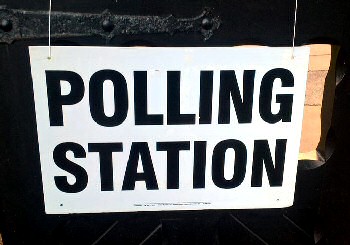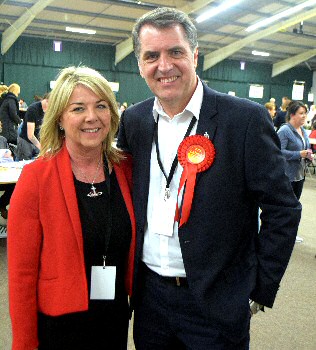|
Should the voting age be lowered to 16?
Report by Georgia Taft

Editors note:- "Georgia has been on a work
placement with us and has been looking at a topic very close to her heart,
the right to vote and have a say in the future of the UK. This is her report
from a very well informed 15 year old, who has a very good grasp on the UK's
political landscape."
AS the election was recently upon us, many arguments surfaced regarding
whether to voting age should be lowered to 16. Especially, after the massive
youth turn out in the Scottish Referendum where the voting age was lowered
to 16. This begs the question, should the UK lower the voting age to 16?
Countries such as Austria and Norway have experimented lowering the voting
age. Austria became the 1st European country that has permanently lowered
the voting age to 16, in 2011. Political interest among young Austrians
increased when they were given the opportunity to vote and had the ability
to discuss and debate the issues in School. On the other hand, Norway
experimented with lowering the voting age in 2011, but the effect was less
successful. The trial saw some but not all municipalities allow 16 and 17
year olds to vote. The eligible teenagers were generally interested in
voting, but when compared to the same age who couldn't vote, they showed no
sign of an increased sense of civic responsibility.
Some people believe lowering the voting age is too much responsibility for
young people, especially with the amount of pressure they are already under,
due to exams. However, when you are 16 you can, marry freely in Scotland and
marry in the UK (with parental consent). Marrying is a huge decision and
shows that some young people are already thinking about the future ahead of
them. Secondly, you are able to buy a lottery ticket, which is a form of
gambling. If the government deems you responsible enough to handle millions
of pounds, (the youngest winner at 16, won 2 million pounds) then you should
be responsible enough to make political decisions.
There is also the argument that young people are too young to be trusted.
For instance, 16 year olds haven't entered the world of Tax, homeownership,
employment or pensions. These economic issues are often the forefront of
election campaigns. This means that there is lack of experience from making
a considered judgment at the ballot box. In addition to that, 18 to 24 year
olds have the lowest turnout point of any age group, with only 44% of voters
aged 18 to 24 voted in 2010 (according to the intergenerational foundation).
However, 1.57 million people registered to vote for the 2017 general
election, with an astonishing 805,000 people under 24 (according to the
Mirror). Although, there are also concerns that teenagers who want to casts
their vote will be influenced by their Parents. For this reason;
consequently, some people believe there is no point in lowering the voting
age, because young people won't be thinking for themselves.
Despite all of this, by most people's 16th birthday, they will either be in
their final year of Secondary School or 1st year of College. This means that
young people are already making major decisions about education and which
path they would like to take in the future. Why should those making
decisions about their own future be unable to cast their vote about the
future of the country? Secondly, young people are more integrated with
current affairs. Anyone who has Facebook or Twitter is consistently fed news
and updates. It's undeniable that it is inescapable whether you are young or
not. Young people today are far more up to date on anything that happens in
the world. It could be celebrity news or current affairs, they know about it
through social media. Finally, at the end of the day young people are the
future of the UK. At 16 you're already considering issues such as
university, theoretically you could get Taxed at 16 and some young people
are even part of the working world. 16 to 17 year olds are not children,
they are taking steps into adult life, and therefore they should be old
enough to cast their vote towards the future of the country.
Back in April, This question was asked to Southport Reporter's Twitter
Followers, interestingly 46% said 16 year olds should be able to vote, but
54% said definitely not! Reading this report, by a 15 year old, does it
change your views? Do you think the voting age should be restricted? I would
love to hear your thoughts. Please email Southport Reporter, via:-
News24@SouthportReporter.com.
|
 |
Liverpool City Region Metro
Mayor commits to Mersey Barrage

LIVERPOOL City Region Metro Mayor Steve Rotheram
has spoke to a global
investment conference to highlight the feasibility of a tidal barrage for the
Mersey Estuary, which he believes will have a massive impact on the City
Region's growth trajectory.
Speaking at the 3rd annual UK Wide Infrastructure Investment Conference in
Milton Keynes, where he addressed a room full of significant institutional
investors, Steve Rotheram said that devolution now gave City Region's the
opportunity to think big, take a long term perspective and begin to redress the
infrastructure investment imbalance that has until now favoured projects in
London and the South East.
Metro Mayor Rotheram will be reviewing all the historic studies and data
relating to the project to harness the Mersey's potential as a source of green
energy, but is also inviting potential funders and partners to come forward to
take part in the next Phase of commercial and technical feasibility work.
To underline the Metro Mayor's commitment, he also intends to appoint a project
director to take this work forward.
The Labour politician outlined some of the key infrastructure projects already
being delivered in the region; including:- Peel's Liverpool 2 Port Expansion, the
massive Burbo Bank Wind Farm and the Mersey Gateway crossing at Runcorn; but
signalled a commitment to 3 major projects that he said would have a
transformational impact.
Liverpool's Metro Mayor Mr Rotheram said:- "We need
to expend the scale of ambition in the city region. For decades, the task of
harnessing the enormous tidal power of the River Mersey as a source of renewable
energy has been simply consigned to the too difficult and complicated box. A
Mersey Barrage would be a source of green energy, a stimulus to employment and
investment, and a project with massive transformational potential. Indeed, it
has already been identified that this project alone has the potential to provide
enough power to meet the average needs of 200,000 homes. This would be a
significant leap in achieving my ambition to be a carbon neutral city region by
2040. As the reality of Global Warming becomes more obvious and urgent to all
rational and responsible political leaders, this is simply an opportunity that
cannot be squandered or put on the back burner. Bringing forward a new business
and logistical plan for a Mersey Tidal Barrage will be one of the major
priorities of my Mayoral administration. As a source of green energy, a stimulus
to employment and another opportunity to integrate and connect communities on
both sides of our river, it is a project with massive transformational
potential. In his speech he also re-iterated his call for rapid progress on the
delivery of Northern Powerhouse Rail, and underscored the compelling economic
and logical case for the initial phase of the project to be a new fast rail
connection between Liverpool and Manchester. In addition he identified the
urgent need to invest in the region's digital infrastructure to guarantee super
fast broadband connectivity across the City Region, to harness the potential of
the area's burgeoning digital and creative economy. With the new powers devolved
to the region over strategic planning, such as creating a Mayoral Development
Corporation, a spatial strategy, a Land Commission, a Single Investment Fund, we
have the tools to match our ambition to address the big issues and the long term
challenges. Connectivity and infrastructure have been at the core of our
economic story as a region, and they will be foundations of our future growth
and prosperity."
|












